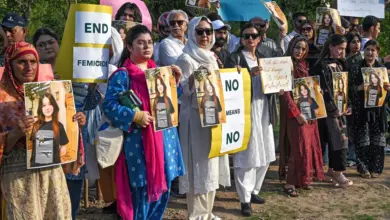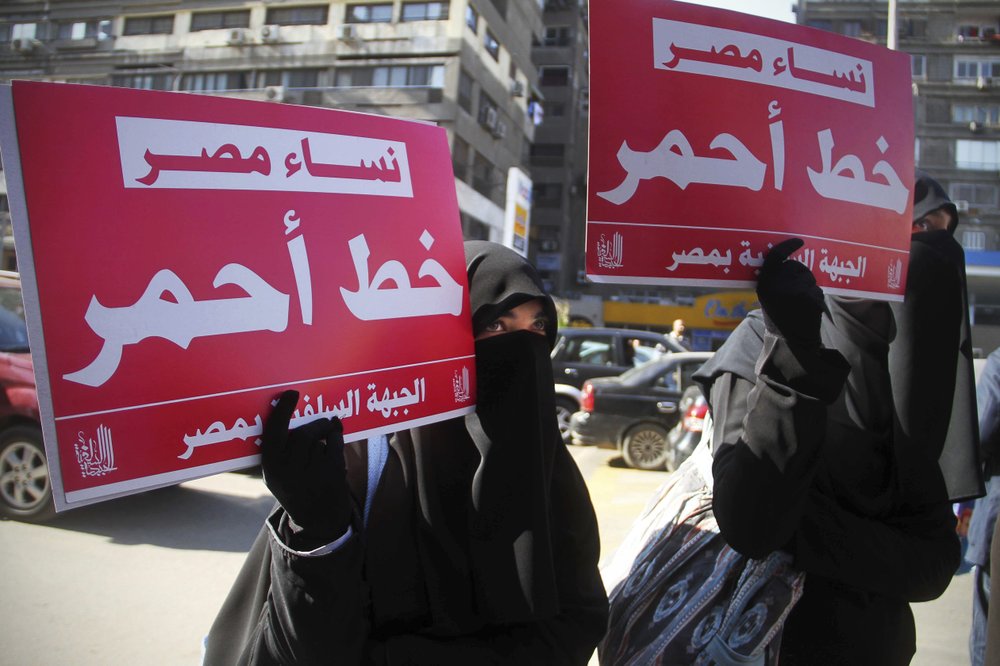Women gathered Tuesday, 8 March, to speak up about their inclusion in the Egyptian state and present demands. Many women want the constitution to specifically state that a woman can run for president and others want specific clauses to address women’s treatment by the judicial system.
As I explained to a group of onlookers my views on the plight of the Egyptian woman in Egypt, I was met with contention. Many of the men around me were adamant that a woman should have nothing to do with politics and some insisted it was insulting that we would be out to protest at all. As I grew more and more frustrated, I realized that I was, once again, listening to the opinions of men. This is a month littered with events commemorating women, so let women’s voices be heard!
I sought out women at the protest, in the street, on the way home and asked them about the obstacles that they face and the coping mechanisms they use to get through their lives. In this two-part snapshot of the plight of the Egyptian woman, part one will deal with grievances and part two, with coping mechanisms for survival.
So… what frustrates you most about being a woman in Egypt?
“These days, my parents' attempts to control me. I am a journalist and am allowed by law to be out late if events are going on. They tell me that there are men to do this work and there are male journalists who should take care of this coverage.They tell me I’ve forgotten I’m a female.” – Heba Afify, Al-Masry Al-Youm reporter
“My biggest grievance is often with women themselves; most women I have met are completely unaware of their equal rights as citizens and go through their lives obeying codes that they think are set in stone by religion and their patriarchs. If you look at some of the most active feminists in this country, you will find religious women as well as atheists, young and old, but all are extremely educated and well read on the rights to which women are entitled. I also have grievances with women who don’t fight sexual harassment–I believe this helps perpetuate its normalcy in our society. ”
– Soraya Morayef, editor
“What frustrates me most about being a woman in Egypt is simply the way most men look at you in the street. There is a very invasive way in which men ogle women in this country and as an Egyptian woman, it really makes me feel disrespected and worried and afraid in my own country–my own home.”
– Tamara Samir, advertising executive
“As a woman, my biggest pet peeve is having to deal with major generalizations like “women can’t drive” or “women can’t be managers”–this is absolutely ridiculous. You cannot generalize the characteristics of one woman on half the population of the world! Women and men both have mood swings, it’s not all about having a menstrual flow–Egyptian men lean very heavily on a symptom of pre-menstrual syndrome. If you think about it, it’s really silly.”
– Dalia Naguib, freelance photographer
“Women who act upon some belief that men are better at making decisions or know more than women really make me angry. When a friend comes and tells me she can’t go out because her husband ‘won’t let her’ or can’t travel alone because her husband ‘doesn’t think it’s right', I just want to scream as loud as I can. If a woman thinks it is not right for a woman to travel alone, can’t she just say that herself? And if she doesn’t believe it, why would she follow it just because her husband says so. I can’t understand why women want to remain children forever and want to replace their fathers with another father.”
– Samya Abdel Aziz, cook
“My only frustration in being a woman in Egypt is the sexual harassment. It is everywhere, every day and now that the revolutionary spirit is dying out, it’s back again.”
– Sylvia Samir, student
“I get frustrated with women who get frustrated with their lives. Everyone faces different types of issues–we all battle through them to get through our day. Why should we focus only on issues that women deal with. Women should take only what they are willing to take as far as treatment is concerned. Each woman should fight her own battle. It is dangerous to gather different requests together and call them ‘women’s issues’.”
Naglaa Fathallah, teacher




